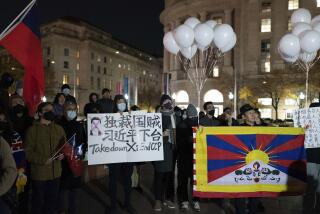Chinese Aides Under New Scrutiny : Party Issues Guidelines to Curb Official Abuse of Power
- Share via
PEKING — Xiang Nan, the powerful Communist Party secretary of China’s Fujian Province and a member of the party Central Committee, recently ordered all high-ranking cadres within his domain to turn in the luxury imported cars they obtained last year.
According to the People’s Daily, the official organ of the Chinese Communist Party, Fujian Province alone purchased more than 180 “high-quality cars” from overseas. The brand was not named, but the cars were probably Mercedes-Benzes. Provincial leaders are required to travel a lot and wanted cars that are especially durable, People’s Daily explained.
“The masses had much to say about this,” the Communist Party newspaper acknowledged. Exactly what the masses said was not published, but Xiang Nan and other Fujian leaders are now reported to be riding once again in smaller “common cars.”
The return of the cars and the frank acknowledgment of criticism is part of a broad new campaign launched by the 40-million-member Chinese Communist Party to shore up its standing with the public.
Junkets, Lavish Banquets
Over the past few weeks, in rapid order, the party leadership has issued a series of new rules aimed at curbing high living and abuses of power by Chinese officials. The regulations limit overseas junkets, lavish banquets, conventioneering at tourist resorts, and nepotism.
At the same time, party leaders are carrying out a new anti-corruption drive aimed at weeding out those who have made use of their positions for improper financial gain. Foreign journalists here have been told that, now that the lunar new year’s festivities ushering in the Year of the Tiger are over, some high-ranking “tigers” or their children will be prosecuted for economic crimes. Peking is awash with rumors about exactly who will be put on trial.
A few clues came last week when Communist Party officials accused former Astronautics Minister Zhang Jun and current Vice Minister Cheng Lianchang of running a multimillion-dollar smuggling racket involving the importation of more than 180,000 color television sets. The ring apparently operated through the Peking-based Guangyu Industry & Trade Co., run by the Astronautics Ministry. Related prosecutions are expected.
Like Soviet Campaign
The new Chinese campaign parallels the one launched in the Soviet Union under party leader Mikhail S. Gorbachev. Although their approaches to economic theory and Marxism differ greatly, the Chinese and Soviet Communist parties now seem to be trying to confront some similar political problems--that is, the need to create a more ascetic, hard-working organization of cadres and to overcome pervasive public cynicism about the special privileges that party members enjoy.
Last month, Soviet television showed President Andrei A. Gromyko talking with ordinary citizens at a Moscow department store. In similar fashion, one night last week, Chinese television displayed senior party leaders conversing with common workers, peasants and teachers. Chinese Foreign Minister Wu Xueqian, who usually spends his days with foreign dignitaries, was shown visiting the home of a peasant family in the Peking suburbs.
In China, the Communist Party has carried out several earlier campaigns against high living and corruption. In 1977, for example, the People’s Daily denounced what it called “extravagant wining and dining” by party cadres and urged a rededication to “our party’s glorious tradition of plain living and hard struggle.”
Response to Criticism
The new campaign appears to be a response to widespread public criticism that it is high-ranking party and government leaders who are profiting most from the Chinese regime’s economic reforms and open-door policies.
Chinese officials have acknowledged that many of the private businesses originally set up under the nation’s economic liberalization were the creations of party officials or their children. High-ranking officials have also made use of the open-door policies to travel abroad and to send their children to universities overseas.
Last fall, during a series of demonstrations in Peking and several other cities, Chinese students voiced complaints about nepotism, special privileges for high-ranking officials, and the use of money for luxury goods in China at a time when students are having trouble keeping up with inflation.
In an effort to counteract the protests, many of China’s provincial party secretaries and governors went to universities to hear the students’ grievances. In one such meeting, Xiang visited the Fujian Forestry College and told students they should “regard hardship as a pleasure. . . . Our country is still comparatively poor, and Fujian is still a poor province.”
Student Meeting ‘Lively’
According to the account in the Fujian Daily, this meeting was a “lively” one, and some students asked the provincial party secretary some unspecified “trick questions.” The newspaper did not say whether any of the students inquired about the Fujian officials’ new imported luxury cars.
The wave of protests apparently took the Chinese regime by surprise. During a series of meetings last month, Communist Party leaders decided to crack down not only on corruption but also on what the party is euphemistically terming its “problems in work style.”
In one public document, the Communist Party Central Committee candidly confessed that the practice of staging lavish receptions and banquets for traveling cadres “did harm to the relations between the party and the people.”
So great is the party’s concern about its public standing that for the time being, it is holding plans for new economic reforms in abeyance while it pursues the campaign against corruption and extravagance. (Party officials are always careful to note, however, that the economic reforms will eventually continue, and that they do not believe corruption is the result of the reform program).
Premier Zhao Ziyang announced last month that 1986 will be a year to “consolidate, digest, supplement and improve on” the changes already instituted in China. There will be no major price or wage changes this year, Zhao promised.
An Ideological Truce
At the same time, a temporary ideological truce prevails in the semipublic skirmishing between reformers within the party who advocate further economic liberalization and the traditionalists who fear the party may be drifting from its socialist moorings.
For the moment, leaders of all party factions appear to be joining in the campaign to improve the party’s public image. Ideological debates continue over such controversial issues as whether China should open a stock exchange, but in general, the party leadership is trying to lower the political temperature this year.
Last month, leading Chinese reformers such as Politburo member Hu Qili and prominent traditionalists such as Politburo member Hu Qiaomu joined together in urging the nation to go see a newly produced movie called “Fascinating Musical Band.”
The People’s Daily gave the release of the movie front-page coverage--the first film ever accorded such treatment in the party newspaper, according to one Western diplomat.
The movie turned out to be a bland, relatively apolitical comedy about happy, well-to-do peasants who form a musical group. After seeing a special screening for Chinese leaders, Hu Qiaomu asserted, “Films that are healthy and beneficial to socialism should get the green light--and bad films should get a red light.”
Foreign Trips Curbed
Meanwhile, beginning in mid-January, the Communist leadership has issued one regulation after another combating what are called “unhealthy tendencies” within the party.
The Communist Party broadsides began Jan. 28 with a circular barring “unnecessary trips abroad under the pretexts of fact-finding and friendship.”
The new rules required all ministers, governors and retired officials to get approval from the State Council, China’s Cabinet, for overseas travel. Furthermore, said the party, those officials who do travel abroad should limit the number of people they take, the number of countries they visit and the amount of time they spend.
Since then, other party circulars have ordered cadres to cut off all connections with business enterprises, to stop using public money for sightseeing trips, to stop staying in deluxe tourist hotels when they travel and to make inspection trips in buses or vans instead of cars.
In some instances, the new campaign seems to be attempting to change not merely the decades-old system of Communist Party privileges, but also Chinese traditions that date back thousands of years. One regulation bars local authorities from making elaborate arrangements to entertain visiting dignitaries, and another prohibits giving or receiving gifts.
Nepotism Targeted
Early this month, authorities issued a series of anti-nepotism rules barring senior officials from telling or suggesting to the party organizational department who should be promoted. If a child or relative of a party official is being considered for a job, the rules say, that official should leave the room during the discussions.
There is widespread skepticism here that these rules, particularly the ones against nepotism, will be effective.
“I can’t believe they’re really going to do away with a system where every work unit employs its officials’ kids,” observed one Peking-based diplomat. “This has been the time-honored way for rural officials to maintain their place in society and prevent their kids from becoming peasants once again. I think nepotism is endemic, and I don’t think they’re going to get rid of it.”
The party now seems determined, however, to try to recapture the public image of thrift and hard work personified for years by the late Premier Chou En-lai.
Gifts and Greetings
At this time a year ago, Chinese officials and newspapers were reviving the traditional lunar new year’s greeting, an expression of hope that a friend will become rich and prosperous. During this year’s holiday, Chinese sources say, the word was passed that the age-old wish for wealth is not to be used, at least not in public.
Instead, authorities handed down yet another set of rules to cover the lunar new year holiday, called the spring festival here. They forbade officials from accepting holiday gifts from their employees or from “using work connections to purchase special spring-festival food at lower prices.”
For the first time, prior approval is be required for all receptions given at public expense. And if such receptions are held, the regime recommended, the fare should not be fruit, candy and pastries, but rather “a cup of tea.”
More to Read
Sign up for Essential California
The most important California stories and recommendations in your inbox every morning.
You may occasionally receive promotional content from the Los Angeles Times.













